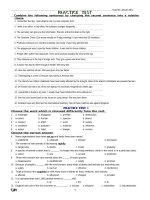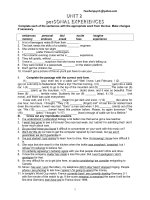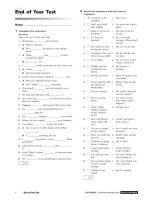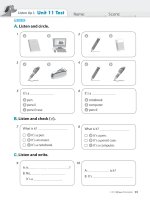HP4 end of unit test 11 new
Bạn đang xem bản rút gọn của tài liệu. Xem và tải ngay bản đầy đủ của tài liệu tại đây (70.09 KB, 5 trang )
END-OF-UNIT TEST 11
Duration: 75 mins
Section 1: Language knowledge (30 marks)
Fill in each blank in the passage below with ONE suitable word.
Debates
Second
Its
are
to
third
production
objective
opponent
discussing
product
on
for
under
competitor
There are three types of a business negotiation. Firstly, a business negotiation is similar to a (1)
…………….. between friends arranging a social engagement. Two parties have a shared (2)
……………..: to work together in a way which is mutually beneficial. Proposals and counter proposals (3)
…………….. discussed until agreement is reached. Both sides hope (4) …………….. repeat business.
This is an agreement-based negotiation, sometimes referred (5) …………….. as a win-win negotiation.
Two other types of negotiation are less founded (6) …………….. mutual benefit, but on gaining the best
deal possible for your side. In the first type, both teams negotiate to independent advantage. This means
that each team thinks only about (7) …………….. own interests. In this type, a seller typically seeks to
sell a (8) …………….. but is less concerned about repeat business.
A (9) …………….. type is the negotiation to resolve conflict, for example in a contractual dispute. Here,
it is possible that each party regards the other as an (10) …………….. and seeks to win the argument. This
is a win-lose negotiation.
II. Choose the best answer
1. If you give us a 10% discount, we ..................... our order today.
a. place
b. will place
c. would place
d. placed
2. If everyone contributed 20% of their salaries to charity, there ..................... no poverty.
a. is
b. will be
c. would be
d. were
3. If we ................. an assistant, we wouldn’t fall behind schedule.
a. employ
b. will employ
c. employed
d. had employed
4. We’ll give you a 10% discount, provided that you ................. within 30 days.
a. pay
b. will pay
c. paid
d. would pay
5. The Board ................. happy as long as our share price remained high.
a. will be
b. is
c. would be
d. was
6. Many people working abroad have difficulty adapting ..................... new cultures.
a. to
b. with
c. in
d. at
7. Our supplier have no objection ..................... allowing us a discount.
a. on
b. in
c. of
d. to
8. Which of the following adjectives goes with the prefix in-?
a. emotional
b. consistent
c. responsive
d. patient
9. Which of the following adjectives does NOT go with the prefix un-?
a. cooperative
b. sympathetic
c. critical
d. polite
10. Everybody in Alphaland is very ................. when they wear suits and ties at work.
a. formal
b. informal
c. cooperative
d. critical
11. A date of time by which you have to do something or complete something is ..................
a. deadline
b. due course
c. last time
d. initial tine
12. If you have tried to solve a problem without success for a long time, but at last you find a way, you
make a .................
a. break-up
b. breakthrough
c. breakdown
d. break-out
End-of-unit test 10/ Module 4
1
13. ……….. he generally explains his ideas clearly, I sometimes find it hard to follow him.
a. Although
b. Because
c. If
d. When
14. They increased their competitiveness …………… their market share would increase.
a. even if
b. so that
c. because
d. despite
15.
They are going to be sharing this office, ................. they’d better learn to get on together.
a. for
b. since
c. in order to
d. so
III. Put the capitalized words in their correct form.
1. SATISFY
We hope the discussions with our creditors will have a ………….. outcome.
2. ACT
The unions have threatened to take industrial…………..
3. CONTRACT
We are …………. obliged to provide adequate security for the shipment.
4. DIFFER
We’ll have to agree ……….. I still think it would be better to outsource.
5. AMAZE
You’d be ……………….at how many people pay $5 for a T-shirt without realizing
it’s counterfeit.
Section 2: Language use (70 marks)
I. Read the following passage and answer the questions that follow
Article A
Negotiations are demanding and may become emotional. You may find your Russian negotiator banging
his or her fist on the table or leaving the room. Accept such tactics with patience and calmness. They are
designed to make it difficult for you to concentrate.
Russian negotiating teams are often made up of experienced managers whose style can be like a game of
chess, with moves planned in advance. Wanting to make compromises may be seen as a sign of weakness.
Distinguish between your behavior inside and outside the negotiations. Impatience, toughness and
emotion during the negotiations should be met with calmness, patience and consistency. Outside the
negotiating process you can show affection and personal sympathy.
Article B
As well as being formal, negotiations are direct. German managers speak their mind. They place great
weight on the clarity of the subject matter and get to the point quickly.
Excessive enthusiasm or compliments are rare in German business. You should give a thorough and
detailed presentation, with an emphasis on objective information, such as your company's history, rather
than on clever visuals or marketing tricks.
Prepare thoroughly before the negotiation and be sure to make your position clear during the opening
stage of the talks, as well as during their exploratory phases. Avoid interrupting, unless you have an urgent
question about the presentation.
Article C
Communicating is a natural talent of Americans. When negotiating partners meet, the emphasis is on small
talk and smiling. There is liberal use of a sense of humour that is more direct than it is in the UK.
Informality is the rule. Business partners do not use their academic titles on their business cards.
Sandwiches and drinks in plastic or boxes are served during conferences.
This pleasant attitude continues in the negotiation itself. US negotiators usually attach little importance to
status, title, formalities and protocol. They communicate in an informal and direct manner on a first-name
basis. Their manner is relaxed and casual.
The attitude 'time is money' has more influence on business communication in the US than it does
anywhere else. Developing a personal relationship with the business partner is not as important as
getting results.
Article D
At the start of the negotiations you might want to decide whether you need interpreters. You should have
documentation available in Spanish. Business cards should carry details in Spanish and English.
During the negotiations your counterparts may interrupt each other, or even you. It is quite common in
End-of-unit test 10/ Module 4
2
Spain for this to happen in the middle of a sentence. For several people to talk at the same time is accepted
in Latin cultures, but is considered rather unusual in Northern Europe.
The discussion is likely to be lively. In negotiations, Spanish business people rely on quick thinking
and spontaneous ideas rather than careful preparation. It may appear that everybody is trying to put his or
her point across at once. That can make negotiations in Spain intense and lengthy, but also enjoyably
creative.
From the Financial Times
Choose the best answer
1. In which country do negotiators show strong emotions?
a. Russia
b. Germany
c. The US
d. Spain
2. Which of the following statements is NOT true about a US negotiation?
a. Negotiators focus on results rather than developing relationships.
b. It is usual for the atmosphere to be relaxed and friendly.
c. Negotiators like to talk about business immediately.
d. You should start a negotiation with general conversation.
3. In a negotiation with German managers, …………
a. you should not give the other side too much as they will not respect you.
b. you should plan your tactics carefully.
c. you should think of ideas during a negotiation rather than before it starts.
d. you should not stop someone while they are talking.
What does each of the following underlined words / phrases refer to?
4. … during the opening stage of the talks, as well as during their exploratory phases. (Article B)
5. They communicate in an informal and direct manner on a first-name basis. (Article C)
Which words in the passage mean the following?
6. the methods you use to get what you want tactics
7. when you find out what other side wants …………
8. the way things are done on official occasions …………
Fill in each blank with ONE suitable word from the passage. Put it in its correct form or tense.
9. The sales manager phoned her ……………. in another company to renew the exclusive distribution
contract.
10. An agreement was reached after lengthy ………………
II. Writing
Recently, your friend Minh Van, who works in another company, has had a problem at work. Her
colleague, Tam, always gets to work late and leaves off early. He never seems to do anything. In meetings,
he always interrrupts people while they are talking. Their department manager, Mr Que, does not know
the prolem. Moreover, he is very weak and if he knew, he could not do anything. She does not know
whether she should try to talk to other people she works with about Tam so that they can find a way of
persuading him to change his behaviour.
Write an email (not more than 100 words) to your friend Minh Van, advising her what to do.
IV. Listen to the talks, and then answer each question about them by marking the correct choice —
(A), (B), (C), or (D).
1. Why is the caller unable to speak to anyone?
a. It is after business hours.
b. The representatives are talking to other people.
c. The airline's phone system is out of order.
End-of-unit test 10/ Module 4
3
d. The airline has gone out of business.
2. What is the caller told to do?
a. Stay on the phone.
b. Use another number.
3. Who is listening to this announcement?
a. Passengers on an airplane.
b. Visitors to an amusement park.
4. What are listeners told to do in an emergency?
a. Wait for assistance.
b. Pull up the safety bar.
5. Why is this announcement being given?
a. To request assistance.
b. To warn of an emergency.
c. Call back later.
d. Answer a question.
c. Passengers on a train.
d. Tourists entering a national park.
c. Get away quickly.
d. Call the park personnel.
c. To explain a delay.
d. To provide safety information.
V. You will hear a telephone conversation between a man and a woman talking about the man’s
computer. Fill in the missing information. The recording will be played twice.
1. The man had a problem with: ……………
2. He’s had his computer since: ……………
3. The problem with his computer: slow to ……………
4. The woman recommends: ……………
5. Their technicians are: ……………
THE END
End-of-unit test 10/ Module 4
4









